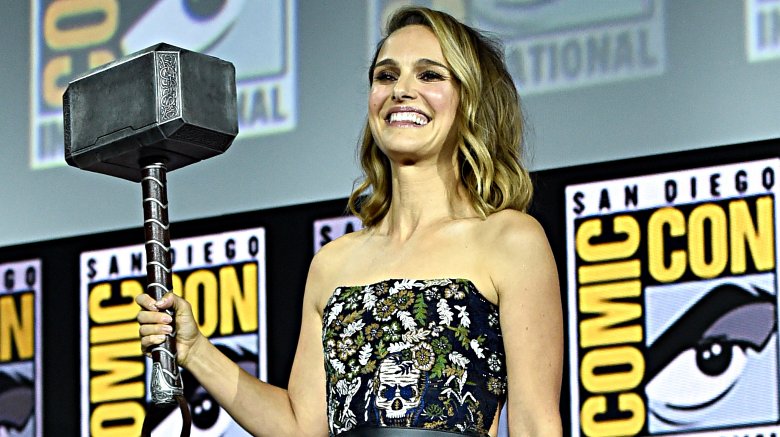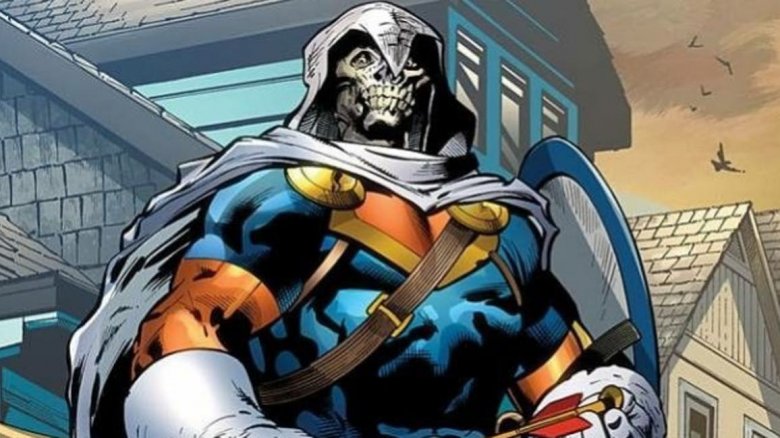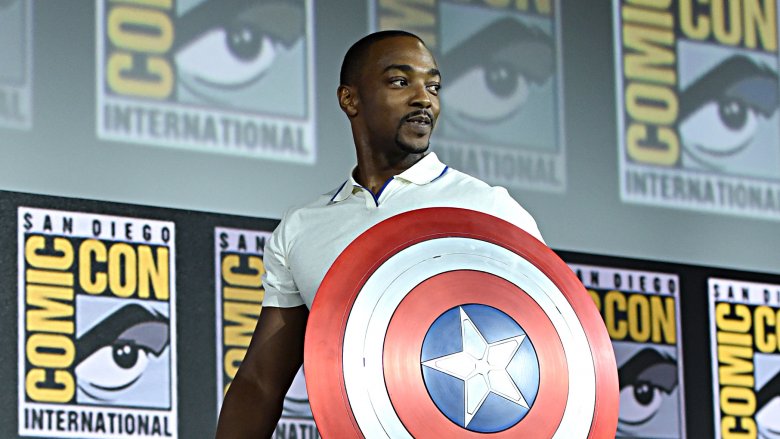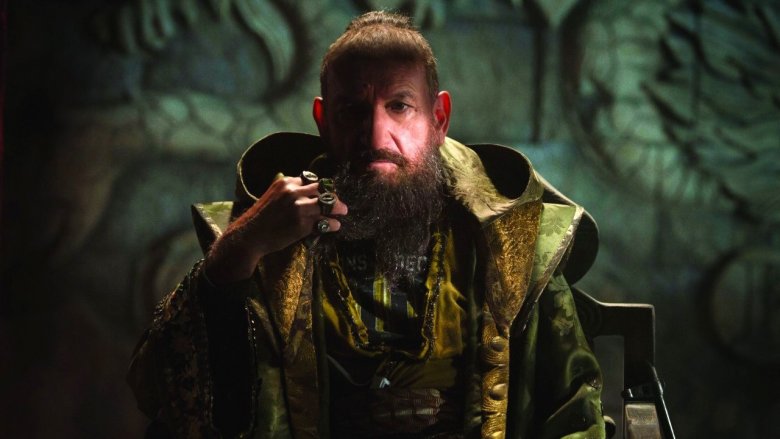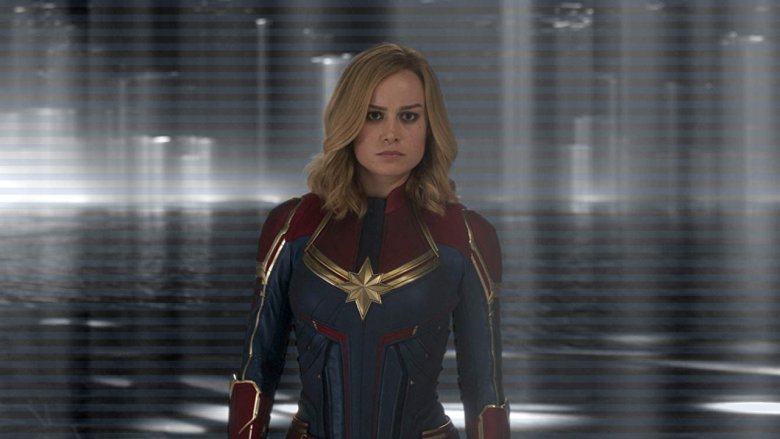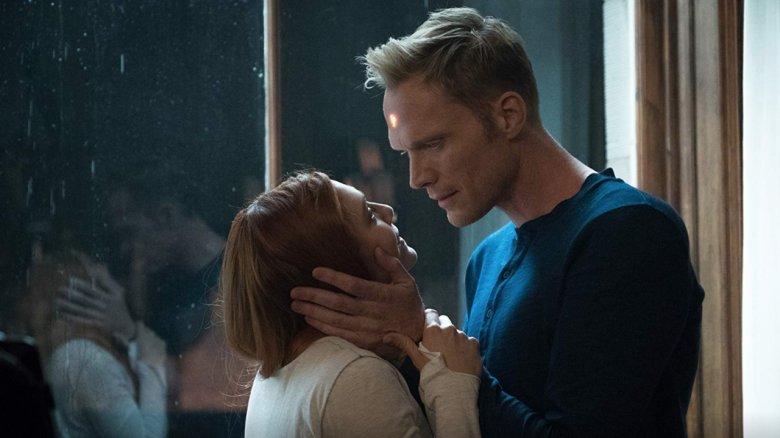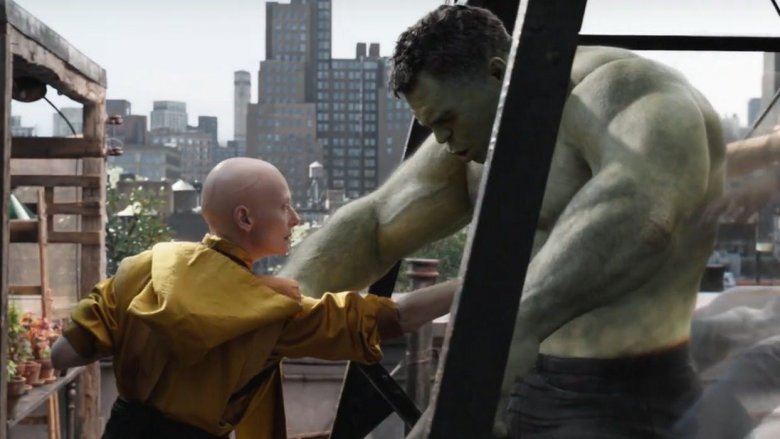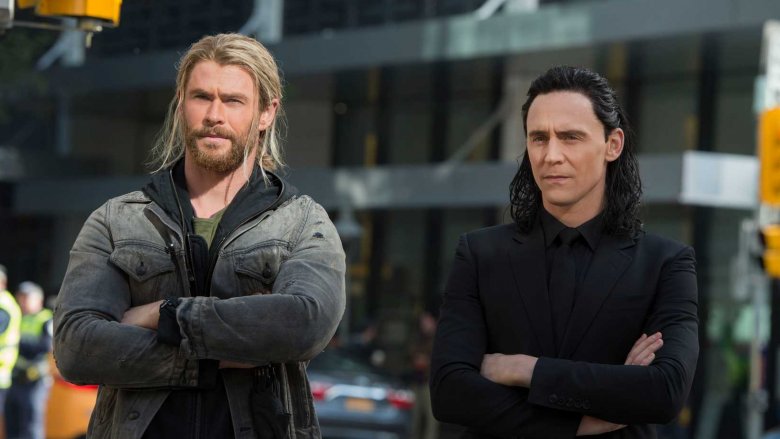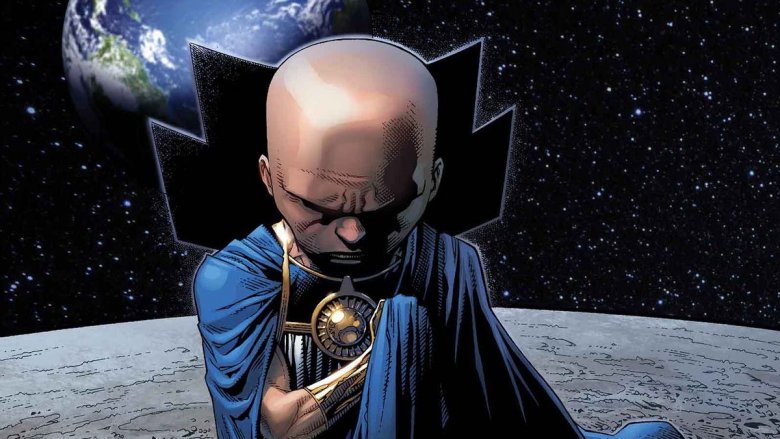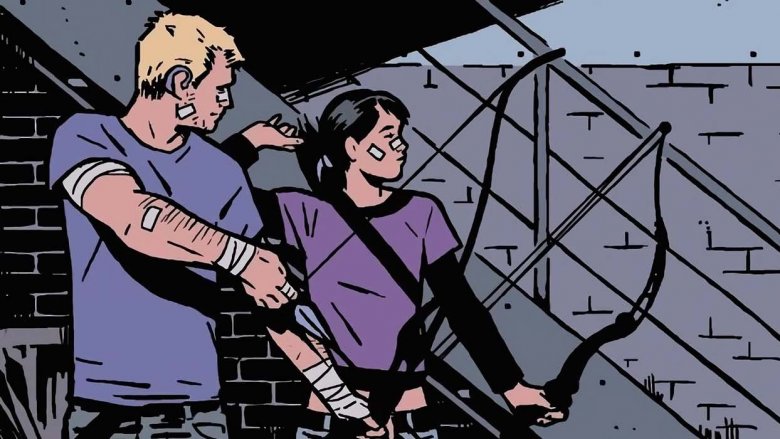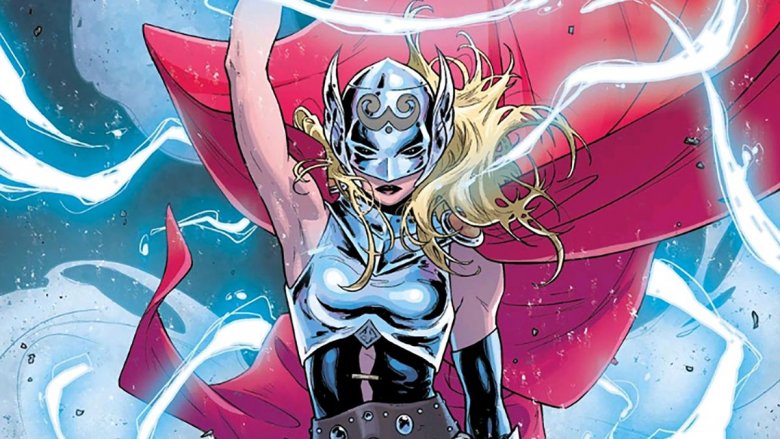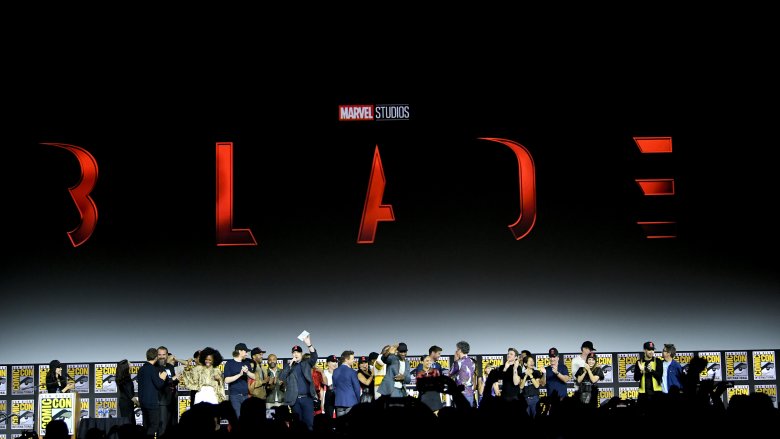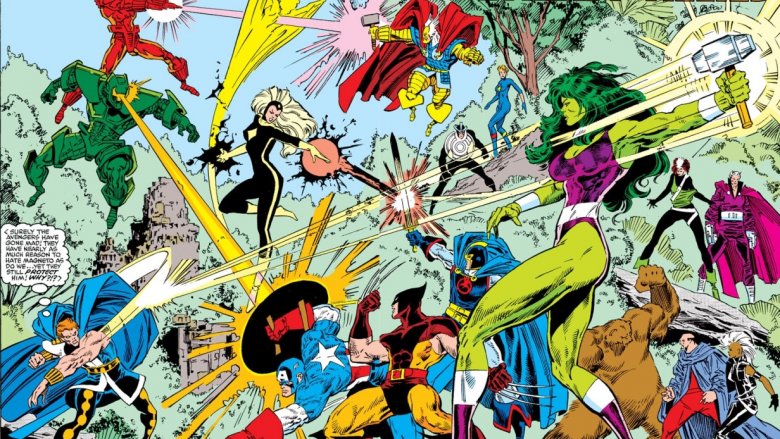Biggest Unanswered Questions After Marvel's Phase 4 Announcements
After months of keeping their post-Spider-Man: Far from Home plans shrouded in secrecy, Marvel blew the roof off 2019's San Diego Comic-Con with their Hall H presentation finally unveiling their Phase 4 offerings. Covering only two years through the end of 2021, Phase 4 of the MCU will consist of five films — including two sequels, two brand new solo features, and the long-awaited Black Widow movie — and an additional five television shows, set to premiere on the upcoming Disney+ streaming service.
While other TV series have ostensibly been part of the MCU, including Marvel's six Netflix series, Agents of S.H.I.E.L.D., and the much-maligned Inhumans series, Phase 4 will mark the first time that TV shows have tied closely into the world of the films, all centered around characters who have appeared in major roles in multiple MCU movies.
However, as illuminating as Marvel's SDCC presentation was, there were a lot of details left up in the air. With so much ground to cover, Marvel Studios President Kevin Feige could only touch briefly on each upcoming show and film, covering only the broadest strokes of cast, plot, and continuity. While we definitely know much more now than we did before, much of the information that Feige revealed only stirred up new questions. Here, we dig into the biggest unanswered questions surrounding Phase 4 of the MCU after Marvel's Comic-Con presentation. [Spoilers for all of Marvel's Phase 3 below.]
Who will play Taskmaster in Marvel's Phase 4?
Although Taskmaster has been announced as the villain for 2020's Black Widow, Marvel neglected to announce which character will be wearing the mask. In the comics, Taskmaster is a man named Tony Masters, who is able to mimic the movements of anyone he sees. This makes him a perfect foil for the MCU's Natasha Romanoff (Scarlett Johansson), whose skill set in the films has been largely confined to her fighting abilities. Perhaps in going up against a villain who can match her combat style punch for punch, Natasha will be forced to lean more heavily on the super-spy training that, until now, the movies have largely glossed over.
However, since none of the announced cast for Black Widow will be playing Tony Masters, it's safe to assume that a different character will be donning Taskmaster's mask. Since David Harbour has already been confirmed as the Red Guardian (the Soviet equivalent of Captain America) and Florence Pugh will be playing comics baddie Yelena Belova, likely candidates include O-T Fagbenle's character Mason, or Rachel Weisz's character Melina.
Weisz may actually make the most sense, since having Natasha go up against another highly trained woman with red in her ledger would fit right in with Marvel's trend of having their villains resemble evil versions of their heroes. Plus, casting the Oscar-winning Weisz as Taskmaster would be perfectly in line with Marvel's tendency to cast top-tier talent in villainous roles.
Will Sam Wilson officially become the new Captain America in Marvel's Phase 4?
At the end of Avengers: Endgame, Steve Rogers (Chris Evans) goes back in time to live out the rest of his days with the love of his life, Peggy Carter (Hayley Atwell). As an old man, he returns to the present, coming back to the demolished Avengers compound where he passes along his vibranium shield to Sam Wilson (Anthony Mackie), who has been one of his closest friends since Captain America: The Winter Soldier. The implication is that, now that Steve is done, Sam will take over as the new Captain America.
However, although Mackie walked onto the SDCC stage carrying Cap's shield, his series is still called The Falcon and the Winter Soldier. It seems unlikely that this would be the title if Sam had already retired the Falcon mantle and suited up as Captain America, which means that even though The Falcon and the Winter Soldier has been confirmed to take place after the events of Avengers: Endgame, it remains an unanswered question how long it'll be before we see Sam fully transition to his new role.
How will Shang-Chi's Mandarin fit in with Iron Man 3?
2013's Iron Man 3 pulled one of the MCU's biggest twists when its "Mandarin" was revealed to be a puppet actor named Trevor Slattery (Ben Kingsley), with his strings being pulled by scheming scientist Aldrich Killian (Guy Pearce). Once this deception is revealed, Killian claims to be the "real" Mandarin, but is killed by Pepper Potts (Gwyneth Paltrow) before he can execute his master plan to assassinate the President and take over the United States.
However, Kevin Feige announced at SDCC that the real Mandarin will finally appear as the villain of Shang-Chi and the Legend of the Ten Rings, played by acclaimed Chinese actor Tony Leung. This Mandarin will supposedly hew much more closely to the version of the character from the comics, who is both a skilled martial artist and a scientific genius, making him an intimidating opponent for the un-superpowered Shang-Chi (Simu Liu).
Given how big a shadow Tony Stark (Robert Downey Jr.) casts over the rest of the MCU, it doesn't seem likely that Shang-Chi and the Legend of the Ten Rings will ignore that a knockoff version of its villain has already appeared in a previous MCU movie, and will therefore address Iron Man 3 in one way or another. The question is whether it be a one-off line dismissing this as little more than an annoyance, or whether Killian and Slattery's farce will wind up having a bigger impact on Shang-Chi than previously suspected.
Will Captain Marvel appear in Shang-Chi during Marvel's Phase 4?
Before getting his MCU gig, Shang-Chi and the Legend of the Ten Rings director Destin Daniel Cretton worked extensively with Captain Marvel star Brie Larson. Larson has appeared in three of Cretton's four feature films, beginning with her lead role in the critically acclaimed film Short Term 12 in 2013, and continuing through the upcoming 2019 film Just Mercy (which stars another MCU alum, Michael B. Jordan).
In a 2017 interview with Mic, Cretton described Larson as "incredibly smart, incredibly collaborative," and "a lot of fun to have on set." And the feeling appears to be mutual, with Larson referring to Cretton as her "chosen brother" in a sweet 2016 Instagram post. So with so much affection between Shang-Chi's director and the MCU's Carol Danvers, might we see Larson appear in Phase 4?
Surprise single-scene cameos have occasionally been a tool Marvel uses to tie its solo features into the greater MCU, such as Falcon's appearance in 2015's Ant-Man, Doctor Strange's role in Thor: Ragnarok, or even Bruce Banner popping up in the post-credits scene of Iron Man 3. Since Captain Marvel 2 won't be hitting theater screens until at least Phase 5, bringing her in for a brief appearance in Shang-Chi could be a great way to keep her at the forefront of audiences' minds while we wait for her solo film, while also helping Shang-Chi fit into the increasingly expansive Marvel universe.
How is Vision coming back?
Brought to life by a combination of Stark tech, Infinity Stone magic, and some lightning courtesy of the God of Thunder, Vision (Paul Bettany) tragically lost his life at the end of Avengers: Infinity War when Thanos (Josh Brolin) ripped the Mind Stone out of his head, using it to complete the Infinity Gauntlet and snap out half of all life in the universe. Although most of Infinity War's last-act deaths were reversed in Avengers: Endgame, the ones that took place prior to the Snap all stuck, making Vision's death, sadly permanent... or so it would seem.
At SDCC, Marvel confirmed that the Disney+ series WandaVision, which will see Elizabeth Olsen and Bettany reprising their roles as Wanda Maximoff and Vision, will take place after the events of Avengers: Endgame. This seems a little odd, considering Vision has been dead for five years at that point, but it would seem Marvel has a workaround for that. Will it be some sort of technological advancement — Shuri (Letitia Wright) seemed to gather quite a bit of data from the Mind Stone in Infinity War, right before her lab was destroyed — or a more mystical method?
Wanda will also appear in Doctor Strange in the Multiverse of Madness, and Kevin Feige has confirmed that the events of WandaVision will indeed play a role in the Strange sequel. That seems to open up a host of possibilities for Vision's return, including reality resets, alternate universes, or just straight-up magic.
Does the Multiverse already exist in Marvel's Phase 4?
According to the way the Ancient One (Tilda Swinton) explained the flow of reality to Bruce Banner (Mark Ruffalo) in Avengers: Endgame, the Avengers' time travel shouldn't necessarily have spun off any alternate timelines. Rather, as long as the Infinity Stones were returned to their proper places in time — which is precisely what Steve Rogers did at the end of the film — any offshoots of the primary timeline would have been "snipped," restoring time to a single, solid stream.
However, in interviews with Endgame directors Anthony and Joe Russo, the brothers have indicated that they believe the events of the film did create some new alternate realities, while writers Christopher Markus and Stephen McFeely have stated exactly the opposite. Then, adding a further wrinkle to all the timeline confusion, Quentin Beck (Jake Gyllenhaal) seemed to introduce an Endgame-induced multiverse in Spider-Man: far From Home, but was ultimately revealed to have been lying.
With The Multiverse of Madness on the way, it seems safe to assume that we'll soon know who was right about the multiverse, who was wrong, and what exactly the multiverse is in the first place. It's curious that Doctor Strange (Benedict Cumberbatch) would be the one to usher in the multiverse, since it was the Ancient One who introduced the concept in the first place. The biggest question now is, was the Ancient One wrong about the Infinity Stones preventing the creation of a multiverse... or are Doctor Strange and Wanda somehow going to create it?
Will Thor learn that Loki is alive in Marvel's Phase 4?
After spending much of the first decade of the MCU locked in a cosmic sibling rivalry, Thor (Chris Hemsworth) and Loki (Tom Hiddleston) finally seemed to come to a place of mutual understanding by the end of Thor: Ragnarok. Loki realized his perception that Thor thought the worst of him was mostly in his head, and Thor finally accepted Loki for who he was. But no sooner had the brothers put their long-simmering rivalry to bed than their ship was attacked by Thanos, leading to Loki's heroic death at the beginning of Infinity War.
However, due to all the time travel in Endgame, a different version of Loki — one who never experienced the events that followed the first Avengers movie — is now alive somewhere in the MCU, and is getting his own Disney+ series. While this Loki likely doesn't carry a high opinion of his big brother, the feeling is almost certainly not mutual. Mourning Loki was a huge part of Thor's character arc in Infinity War and Endgame, and learning he is alive is sure to have a tremendous impact on Thor. While Marvel hasn't said one way or the other whether the events of Loki might come into play during Thor: Love and Thunder, Loki has been such a big part of the Thor movies that we wouldn't be surprised if Loki sets up a grand return for the God of Mischief in his brother's next movie.
Will the multiverse of What If…? impact events in the MCU?
While the Jeffrey Wright-narrated series has been presented as purely hypothetical, standing alone outside of the greater MCU, Marvel has been known to mislead us before. We can't ignore that What If...? — the Disney+ animated series devoted to exploring questions such as What if Peggy Carter became Captain America? — was rolled out as part of Marvel's Phase 4 slate, and is overseen by MCU mastermind Kevin Feige. Previously, everything in each of Marvel's "Phases" has been tied together into a single continuity, all under the watchful eye of Feige. To include a show as part of Phase 4 that has nothing to do with the rest of the MCU, and for Feige to add a one-off show to his massively complex to-do list, seems like a strange and unprecedented move on Marvel's part. It makes more sense if What If...? actually is connected to the rest of Phase 4, and Marvel's just trying to throw us off the scent.
Further, several of the scenarios that first played out in the What If? comics eventually wound up becoming reality in some of Marvel's main titles, and some of those storylines have even made it into the films. "What if Hulk Had the Brain of Bruce Banner?" was a What If? title that may have inspired mainline Marvel Comics events before being brought to life in Avengers: Endgame, and "What if Jane Foster Had Found the Hammer of Thor?" was a comics precursor to the plot line that has been teased for Natalie Portman in Thor: Love and Thunder. Since the premise of What If...? is centered on the multiverse, which will be brought into the primary MCU in Doctor Strange in the Multiverse of Madness (if not before), it's not outside the realm of possibility that Marvel might be using their animated series to set up some characters and storylines in various areas of the multiverse that might ultimately wind up affecting the live-action MCU.
Could Marvel's Phase 4 Hawkeye series set up the Young Avengers?
During the press tour for Ant-Man and the Wasp, Kevin Feige confirmed that Marvel was "planting seeds" for a possible Young Avengers movie. While the lineup of the Young Avengers has changed a bit over the years, one of their members, Cassie Lang, has been part of the MCU for years, as the adorable pint-sized daughter of Ant-Man (Paul Rudd). Although the MCU's Cassie hasn't yet started using Pym particles to change her size, turning her into Stature, the brief glimpse we got of a teenage Cassie (Emma Fuhrmann) in Avengers: Endgame seemed to be a big hint that Stature may be on the horizon.
But perhaps the biggest clue that a Young Avengers film may be imminent is the announcement of Disney+'s Hawkeye series, starring Jeremy Renner. The introduction that played at SDCC flashed from an image of the comics version of Clint Barton to Kate Bishop, Barton's younger protege who ultimately winds up taking up the Hawkeye mantle. Bishop is also a member of the Young Avengers, and her inclusion in the Hawkeye series — which, judging by the logo, looks to be based off Matt Fraction's excellent Hawkeye comics, in which Kate plays a prominent role — could be a major hint that Marvel is moving towards an eventual Young Avengers film.
How will Jane Foster become the Mighty Thor in Marvel's Phase 4?
In Jason Aaron's stellar Thor run for Marvel Comics, Jane Foster becomes Thor by being able to lift Mjolnir after Thor becomes unworthy. In one of Marvel's more surprising announcements at SDCC, it was revealed that Natalie Portman will be reprising her role as Jane... and as Thor. While Thor: Love and Thunder director Taika Waititi said he'll be drawing inspiration from Aaron's comics, seeing Chris Hemsworth's Thor become unworthy in the MCU — right on the heels of his moving "I'm still worthy!" scene in Endgame — may be a little too sad for fans to handle. Plus, Mjolnir no longer even exists in the post-Endgame timeline, having been returned by Steve Rogers to the Asgard of 2013. So it seems like the MCU may need to figure out another way to transform Jane into Mighty Thor, diverging a bit from Aaron's comics.
One possible solution could be that Jane's Thor comes from an alternate reality. After all, Thor: Love and Thunder falls after Multiverse of Madness and What If...? on the Phase 4 timeline, meaning that her origin story taking place somewhere else in the multiverse seems entirely feasible. If Mighty Thor comes from a different reality than the existing Thor we all know and love — maybe one in which it was Jane, not Thor, who defeated the Destroyer in 2011's Thor – it could be an effective way of keeping the MCU Thor worthy while simultaneously introducing Jane's Thor from a universe in which Thor isn't worthy.
How does Blade fit into Marvel's Phase 4?
In perhaps the biggest shocker of the night, Kevin Feige closed out Marvel's SDCC presentation by bringing out two-time Oscar winner Mahershala Ali, who grinned at the audience before putting on a cap with the Blade logo on it. The part-vampire vampire hunter was last seen portrayed by Wesley Snipes in 2004's Blade: Trinity, the conclusion to New Line Cinema's successful Blade trilogy, which is not connected to the Marvel Cinematic Universe.
Now it seems that Blade will be joining the MCU, although Feige wrapped up the presentation before giving any details — and left a whole bunch of unanswered questions. Since Blade didn't appear anywhere on the Phase 4 timeline, it seems safe to assume that Ali's film (which he leveraged his second Oscar to land) will hit theaters as part of Marvel's Phase 5. However, by announcing Ali's casting this early, it wouldn't be too surprising if Marvel has plans for Blade to pop up in the MCU at some point well ahead of his solo feature. One place where a Blade cameo could make sense would be in Doctor Strange in the Multiverse of Madness, which has already been set up as the MCU's first horror film, and therefore seems like a perfect place to introduce vampires to the franchise.
What lies beyond Marvel's Phase 4?
Despite a presentation packed with stunning surprises and major revelations, there was a lot Marvel didn't get a chance to reveal during SDCC. Kevin Feige closed his remarks by saying that he'd run out of time to talk about Black Panther 2, Guardians 3, and Captain Marvel 2, all of which will presumably be part of Phase 5, along with Mahershala Ali's Blade. We can also safely assume that another Spider-Man movie will eventually be in the offing, even though it hasn't officially been announced yet.
But Phase 4 also lacks a big team-up movie, which Marvel hasn't mentioned at all. This is a departure for the studio, which has previously scheduled an Avengers film near the end of each of its Phases. With Avengers: Endgame closing out the saga for the original Avengers team, the possibilities for the MCU's next team-up film are wide open. The safest bet is that at least one major crossover film will be included in Phase 5, but whether that means a new Avengers lineup, the Young Avengers, or the long-awaited addition of the Fantastic Four and the X-Men to the MCU — both of which were teased by Feige — remain unanswered questions.
